Insights



Recently KPMG Knowledge Advisory Services conducted a detailed survey on knowledge management among top 500 organisations in the United Kingdom, France, Germany and the Netherlands. The aim of the survey is to act as a benchmark for the current state of knowledge management in the European profit and non profit sectors, and is being held as the sequel to the 1998 and 2000 surveys (see http://www.kpmg.nl/kas for details).
The 2002/2003 survey provides European business leaders with key findings on:
Business case for knowledge management.
Investment and returns on knowledge management initiatives.
Business areas in which KM is being used to drive performance improvements.
Current and future initiatives
Measures used to ensure successful implementation
The 2002/2003 survey shows that knowledge management is approaching a higher maturity level. Three key challenges for the future deployment of knowledge management stand out:
1 Taking advantage of unexploited business opportunities
2 Extending KM across customers, suppliers and partners
3 Assuring successful implementation
Participants each receive an individual benchmark report for their company. This report provides recommendations from KPMG on the successful mobilisation of knowledge and shows the company’s results compared to the benchmark on the business benefits, positioning and KM initiatives that companies are undertaking.
The full benchmark report provides insight into key questions right now:
How can I get knowledge management to deliver more business value?
Are there quick wins that my organisation is currently overlooking?
How can I get a solid grip on knowledge management investments and returns?
How advanced is our knowledge management compared to other organisations of similar size and market orientation?
Which knowledge management initiatives are rolled out in similar organisations?
fmkmsurvey@kpmg.nl
Knowledge Management is a systematic and organised approach to improve the organisation’s ability to mobilise knowledge to enhance performance.
KPMG Knowledge Advisory Services has been advising in profit and non profit sectors since 1997, in the field of value based knowledge management and has extensive experience in implementing knowledge management initiatives to strategic objectives with over 115 projects in nearly all (business) sectors.
The 2002/2003 survey acts as a benchmark on knowledge management in the profit and non profit sectors and touches on key questions:
How can I get knowledge management to deliver more business value?
How can I get a solid grip on KM investments and returns?
Are there areas and quick wins that my organisation is currently overlooking?
How advanced is our KM compared to other organisations of similar size and market orientation?
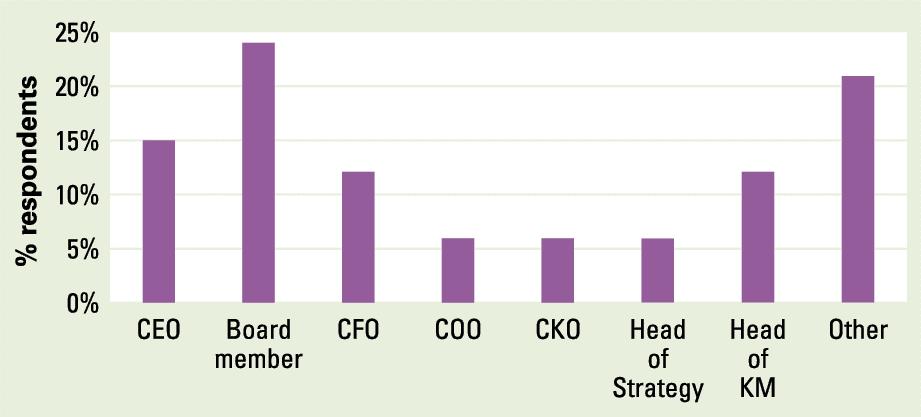
Which KM initiatives are being rolled out in similar organisations?
The persons responsible for KM within the organisations participating in the survey:
This report is about the current and future knowledge management practice in Europe. Data was gathered through a 2002/2003 survey held by KPMG as a sequel to the 1998 and 2000 surveys. Here are the January 2003 findings:
80% consider knowledge a strategic asset.
78% of respondents believe they are currently missing out on business opportunities by failing to successfully exploit available knowledge.
Companies estimate that, on average, 6% of revenue as a percentage of annual turnover or budget is being missed from failing to exploit knowledge effectively.
51% state that involvement of the board members increased in the past three years.
Average KM spending is less than 2% of revenues. ROI is difficult to quantify, but 27% report ROI above required company level, 9% report ROI at required company level, 64% say ROI is unknown.
Companies use knowledge management to realise synergies among units (83%), accelerate innovation (63%), achieve higher customer added value (74%), reduce costs (67%), improve quality (70%) and reduce exposure to risks (26%).
50% report clear financial benefits and returns. Among the non financial benefits, companies experienced quality improvement (73%), increased teamwork (68%) increased speed and responsiveness (64%) and better decision making by frontline workers (55%).
KM is being applied in all business and functional areas, with a core in service delivery (53%), marketing and sales (53%), operations (51%), human resources (43%), R&D (43%), strategy (36%), distribution channels (32%) and procurement (26%).
Our gratitude goes to all participants, who shared their experiences to develop insights that can help managers move forward with knowledge management.
In the last two years, internal communities of practice (45%), competence centres (41%) information centres (41%) and document databases (41%) were started.
In the next two years, the focus shifts from internal to external knowledge sharing and customer and supplier communities.
The 2002/2003 survey is the sequel to knowledge management surveys conducted by KPMG in 1998 and 2000. By comparing the main issues in the respective inquiries over the years, the progress in use of and attitude towards knowledge management can be determined.
Respondents in the 1998 survey showed a focus on storage and accessibility of information by all kinds of technological solutions. Knowledge management was isolated from day to day business and there was little board involvement and a lack of a strategic or long term focus. Companies were also lacking a knowledge strategy and knowledge management initiatives were typified by investigation and feasibility studies, more than actual implementation.
In 2000, knowledge management was a more accepted part of the business agenda, although knowledge was not broadly seen as a strategic asset. The survey results showed a performance difference between companies with and without knowledge management programmes. In other words: the benefits of KM were being realised. On the other hand, organisations were failing to tackle knowledge management’s real challenges. Companies with knowledge management programmes pointed out problems, such as the lack of time to share knowledge, failure to use knowledge effectively and the difficulty of capturing tacit knowledge.
The 2002/2003 survey shows that knowledge management is approaching a higher maturity level. The majority of respondents indicate knowledge as a strategic asset. There’s a growing board/management involvement. Knowledge management is becoming explicitly linked with the capturing of missed business opportunities. And the scope of knowledge management is being extended. In the next two years, companies expect to shift focus from internal to external knowledge sharing. Three key challenges for the future deployment of knowledge management stand out:
1 Taking advantage of unexploited business opportunities
2 Extending KM across customers, suppliers and partners
3 Assuring successful implementation
78% of respondents believe they are currently missing out on business opportunities by failing to successfully exploit available knowledge. An average of 6% of revenue as a percentage of total turnover or budget is being missed annually by failing to exploit knowledge effectively. There is a clear need for methodologies and tools to exploit key knowledge domains across critical business functions and processes.
Finding these unexploited golden nuggets and business opportunities, and defining the appropriate knowledge management projects to exploit the available knowledge quickly and effectively is a key challenge for every company in the current turbulent economic environment. In KPMG ’s experience, knowledge management can contribute to hard business objectives, such as cost effectiveness, profit and a quantified return on investment. The way forward is to define and assess the knowledge areas underlying corporate strategic objectives and to design projects that will impact the knowledge base and mobilise employees working with this knowledge across different units in the company.
Strategic objectives can only be achieved when internally linked to clearly defined competencies and end to end business processes. These competencies and business processes are directly connected to key knowledge areas. Often these key knowledge areas are under managed and strategies are bound to fail or wither away. KPMG’s assignments focus on identifying, fortifying, managing and auditing these key knowledge areas in order to enable the client to make maximum use of these resources.
You can take on the challenge of taking advantage of unexploited business opportunities when you need to:
Assess strategic capability during strategic and investment decision making processes.
Assess ability to exploit key knowledge domains across business functions and processes.
Standardise offerings and harmonise operations across business segments and countries.
Integrate acquired businesses and/or share knowledge with alliance partnerships.
Through series of structured workshops and web enabled surveys, KPMG can assist you to:
Find the knowledge domains underlying corporate strategies: Establish which knowledge domains are keeping you in business and focus on the current and future competencies that are differentiating the company from the competition Analyse knowledge gaps and focus KM efforts: Show which knowledge areas in the business, processes or markets are properly anchored within your organisation and which areas need immediate attention.
Assess employee skills in the required knowledge areas: Find out whether the company has the people and the competencies required to implement strategic change and restructure the business.
Short list and start up initiatives that support overall business strategy: Build a balanced project portfolio, provide selection criteria for KM projects and communities of practice, realign and short list (potential) initiatives, prioritise and assess feasibility, develop value propositions for projects and communities and specify business returns, find sponsors, mobilise resources and provide assistance in setting up key performance indicators, monitoring and performance measurement systems, to assure realisation of their benefits.
In the next two years, companies expect to shift focus from internal knowledge sharing (databases, employees, etc.) to external knowledge sharing (suppliers, customers, etc.) by putting a clear emphasis on starting initiatives like knowledge networks with suppliers and customers. There is a clear need for facilitating the information exchange on what happens upstream and downstream and to use this knowledge on a just in time basis in the company processes
Flexibility in reacting to changes in demand and coordinating supply chain activities correspondingly quickly is a key challenge for operating in today ’s difficult environment. Today’s supply chains and innovation networks are becoming dedicated chains to exploit specific niches globally, offer shorter time to market, or customise the product design as late in the supply chain as possible. Consequently, the need to know what happens upstream and downstream is imminent. In KPMG’s experience, companies can increase speed and build to actual demand through managing critical relations, building a common view of where the market is heading, jointly discussing technology developments and transferring R&D and critical know how, with customers, retailers, distributors, suppliers, trading partners or knowledge institutions, to use this knowledge on a just in time basis in the company processes.
Supply chain collaboration can only be achieved when there is a strategy for exchanging information in partnerships and the information and knowledge management capabilities are strengthened. A process is needed in which the value of new, external knowledge needs to be recognised, assimilated and applied to commercial ends. Instruments are needed to enable quick access to the expertise, skills and information among partners in strategic alliances, joint ventures and cooperative agreements. KPMG’s assignments focus on creating the flexibility to drive innovation and new products among partners, and facilitating the information exchange on what happens upstream and downstream
You can take on the challenge of extending KM across customers, suppliers and partners when you want to:
Improve supply chain planning and forecasting.
Share market data and market developments with selected partners.
Explore technology developments through joint R&D efforts and product development.
Manage critical supplier performance and transfer know how to critical suppliers.
Through workshops, web enabled surveys and community platforms, KPMG can assist you to:
Identify complementary knowledge and commit key people who have technological vision and know how required.
Determine a safe level of knowledge exchange and security requirements among partners.
Start knowledge processes to bringing insightful and reliable information into meaningful strategic decision making.
plug and play community platforms for exchanging information and sharing know how across functions, business units and geographically dispersed locations.
Companies report that the return on investment in knowledge management initiatives has been at and above the required company level. However keeping the wheel turning appears to be more difficult than anticipated. Many companies indicate they have difficulty in making the necessary changes to the organisation and underestimated the complexity of implementing knowledge management, because busy employees are busy. Making knowledge management a daily priority for employees and integrating it into the business processes seem to be hindered by a lack of measures to counteract the lack of a knowledge sharing culture and time or priority among users, lack of understanding at senior levels, and to prevent employees from loosing commitment. Unfortunately, capturing knowledge to create repositories that are not used or maintained is a waste of time and money. This is a key challenge for many knowledge management efforts, as merely implementing knowledge management does not necessarily create an active workforce committed to using the best knowledge available in the organisation.
Finding the right strategy to develop employee support for realising knowledge driven corporate strategies, and to facilitate employees in their daily work processes, is a key challenge for every knowledge management project. In KPMG’s experience with more than 115 knowledge management projects, a series of factors have to be taken into account to assure successful KM implementation. These include factors such as sufficient funding and business driven targets, roles and responsibilities, monitoring, training, support, incentives. Factors are relevant independently of whether the implementation takes place in a single department, across units, across companies or between partners
The success of your knowledge management initiative is ultimately determined by sufficient combination of the above mentioned factors and their incorporation within the line organisation. Successful implementation requires not only that knowledge is collected and distributed, but also, more importantly, that knowledge within the organisation is easy to use in daily processes, that it is accurate and up to date, and that people can quickly contact subject matter experts for feedback and questions. Often the knowledge processes required and the level of organisation needed are fragmented and incomplete, endangering the momentum created by the initiative in the organisation. KPMG ’s assignments focus on implementing the continuous and demand drive knowledge processes needed for the knowledge area at hand, and ensure enforcement of the necessary roles and goals within the organisation, without additional staffing needs.
You can take on the challenge of assuring successful implementation when you want to:
Assure quality, continuity and innovation of a strategic knowledge base.
Capture best practices and lessons learned and use this knowledge in work processes.
Set milestones or programme reviews as structured opportunities for reflection.
Embed the initiative in the line organisation.
Through workshops, web enabled surveys and community platforms KPMG can assist you to:
Analyse knowledge requirements: It is vital to have the right knowledge present at the right time and place to ensure the quality and efficiency of the operation. A knowledge requirements analysis brings to light what knowledge is needed and how it can be obtained and especially maintained.
Establish knowledge processes and organisation: Install a clear organisational structure with roles and responsibilities to ensure content quality, maintenance and user training.
Address cultural issues: Create proper incentives for users to stimulate maintenance and use through appraisal and reward initiatives, or by monitoring and control processes.
Benefits realisation and measurement: Ensure enforcement of the roles, responsibilities and incentive structures by setting up a performance measurement system to measure, steer and evaluate the performance of knowledge management initiatives and to steer and report their benefits realisation.
1.11 10 INSIGHTS FROM THE 2002/2003 SURVEY The 2002/2003 survey deals with several topics concerning KM. We have translated the key findings into 10 business oriented insights. These are outlined in the following section.
Management involvement is high and has increased over the past three years
80% of organisa tions recognise knowledge as a strategic asset.
51% of the companies indicate the role of the board has increased over the last three years.
The management board provides guidelines for knowledge management and actively monitors performance.
Figure 1: Does your company recognise knowledge as a strategic asset?
Companies are missing out on key business opportunities by failing to exploit knowledge effectively
78% believe they are currently missing out on business opportunities by failing to successfully exploiting available knowledge.

An average of 6% revenue as a percentage of total turnover or budget annually is being missed from failing to exploit knowledge effectively.
Figure 4: Do you believe you may be currently missing out on business opportunities by failing to successfully exploit available knowledge?
Figure 2: How has the involvement of the board changed over the past three years?
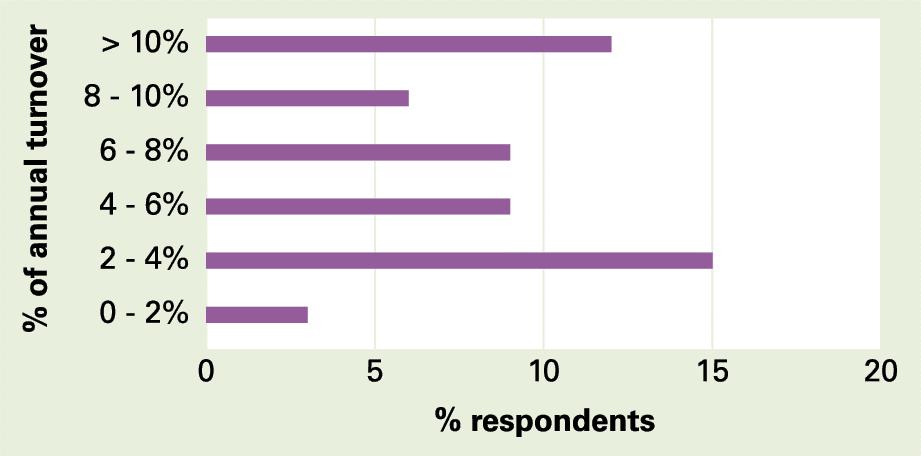
Figure 5: Approximately how much revenue as a percentage of total turnover or budget annually, do you believe is being missed at the moment?
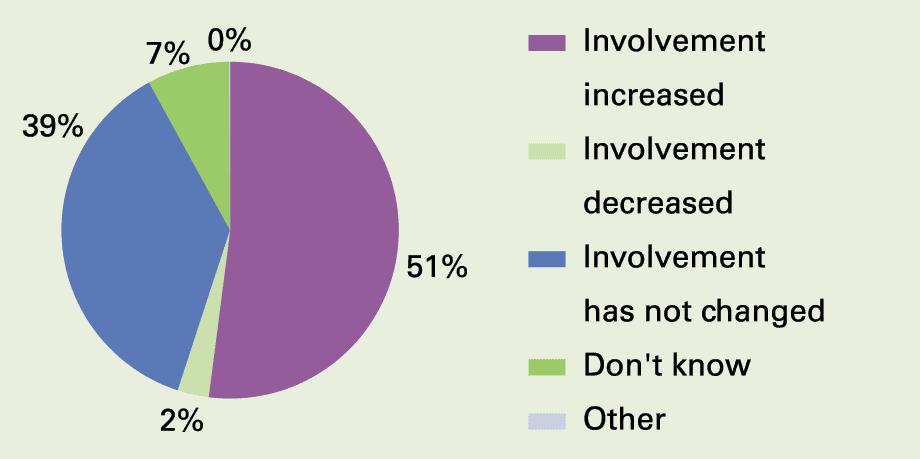

Figure 3: The role of the organisation's management board in relation to KM ?
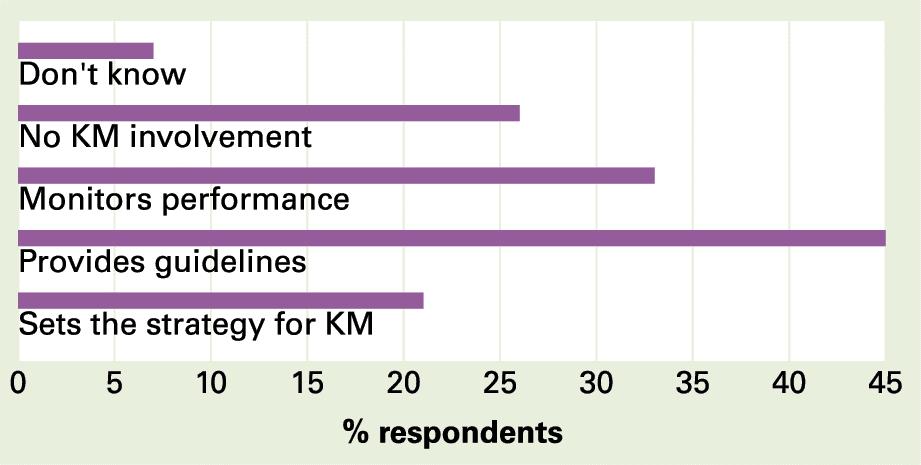
Insight 3. Return on investment
The cost of KM is low and has proved to be an investment with a positive return
The cost of KM is relatively low in comparison to the business opportunities it can exploit. KM spending is on average less than 2%.
ROI is positive, but difficult to quantify. 27% report ROI above required company level, 9% report ROI at required company level and 64% say ROI is unknown.
Figure 6: Approximately how much annually does KM cost as a percentage of the total revenue or budget (incl. software costs)?
Insight 4. Financial and other benefits Companies have benefited financially and non financially in many ways
50% of companies report having experienced clear financial benefits.
Apart from these financial gains, companies have enjoyed other benefits, such as quality improvement, increased teamwork, process improvement, speed and responsiveness, improved work routines and better decision making, and increased problem solving by frontline workers and experts.
Figure 8: What are the perceived benefits of your initiative?
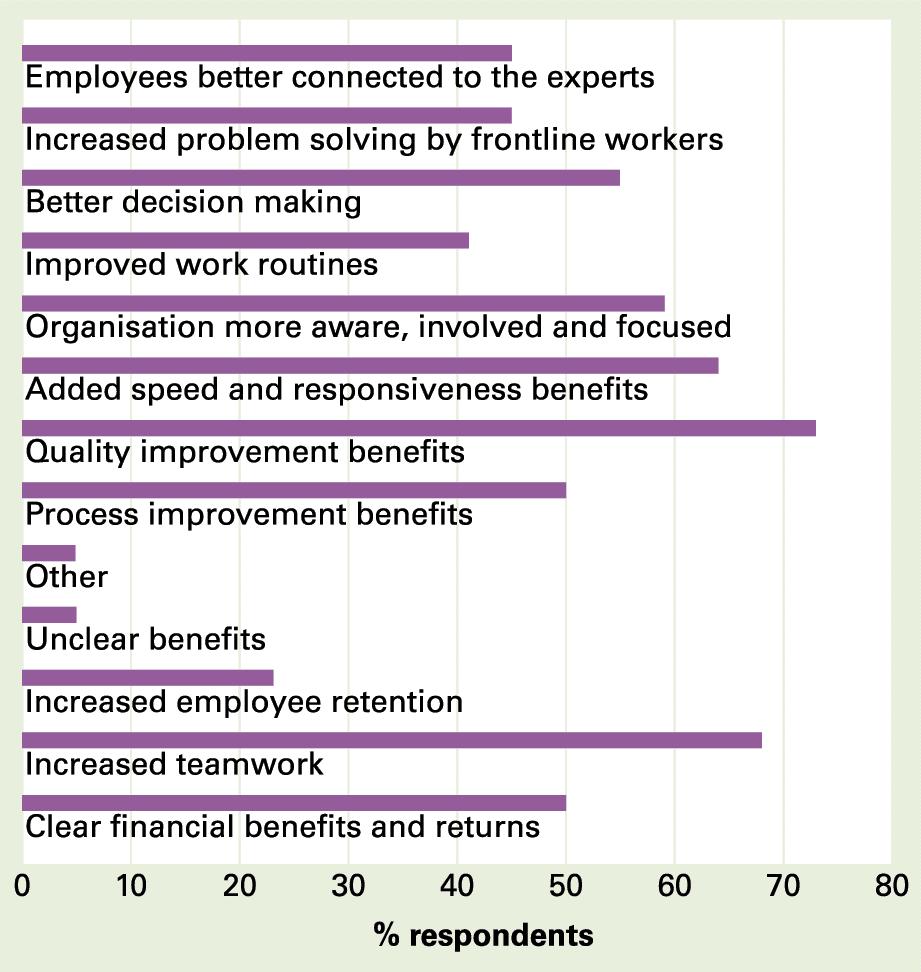
Figure 7: What is the (expected) return on investment on your initiative?
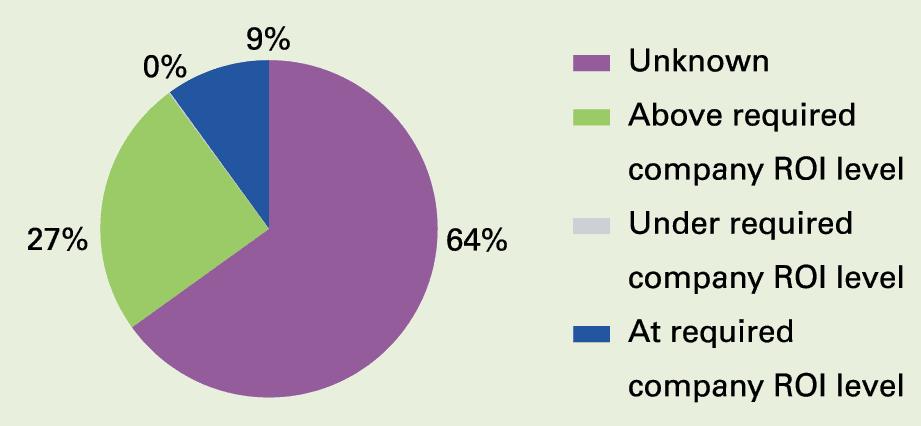
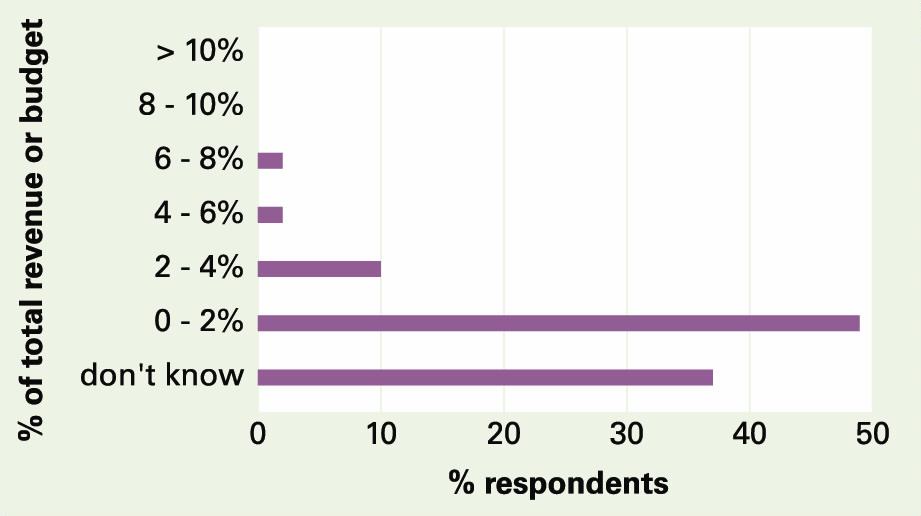
Knowledge management is applied in all business areas, with a core in operations
There is not a single business area that is not being improved through KM. Gradually KM methods and techniques are being applied in all business and functional areas.
The core of applications is found in marketing and sales (53%), service delivery (53%), operations (51%) distribution channels (32%) and procurement (26%).
Knowledge management is also strongly applied in functional areas, such as human resources (43%), research and development (43%) and strategy (36%).
Figure 9: Which business area does your company want to improve with knowledge management?
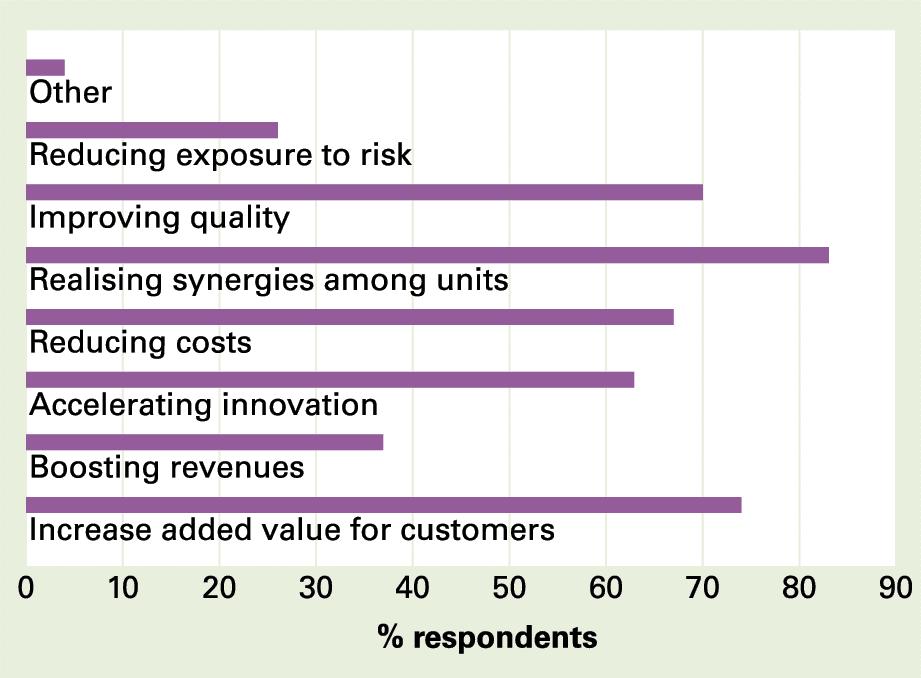
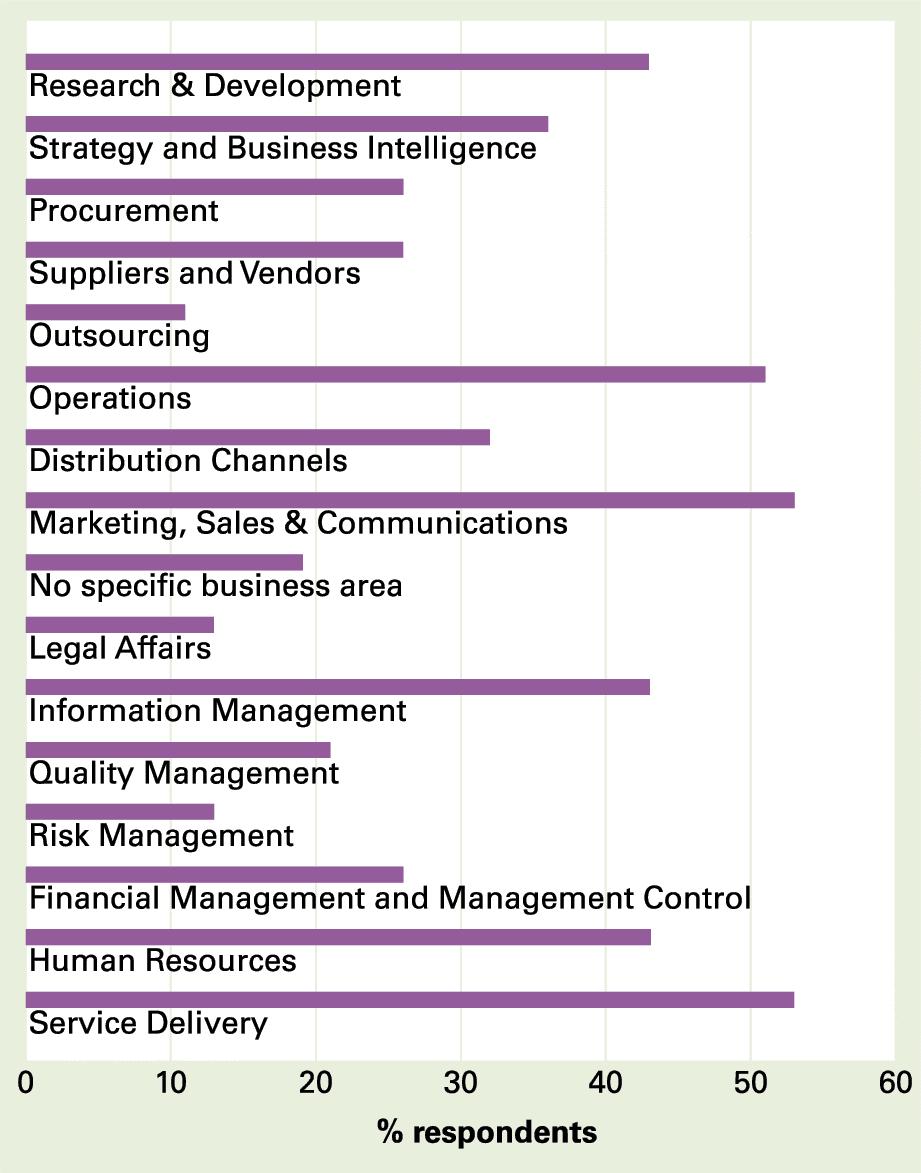
Key objectives are to accelerate sharing across multiple units while at the same time optimising existing work processes
Knowledge management is seen as a key accelerator for realising synergies among units (83%), achieving higher added value for customers (74%), accelerating innovation (63%) and boosting revenues for (new) market development (37%).
At the same time many companies are using knowledge management to improve quality in operational and functional processes (70%), reduce costs (67%) and reduce the exposure to specific business risks (26%).
Figure 10: What does your company want to accomplish by implementing knowledge management?
KM initiatives are shifting focus from internal to external and will increasingly be imbedded in the daily workflow
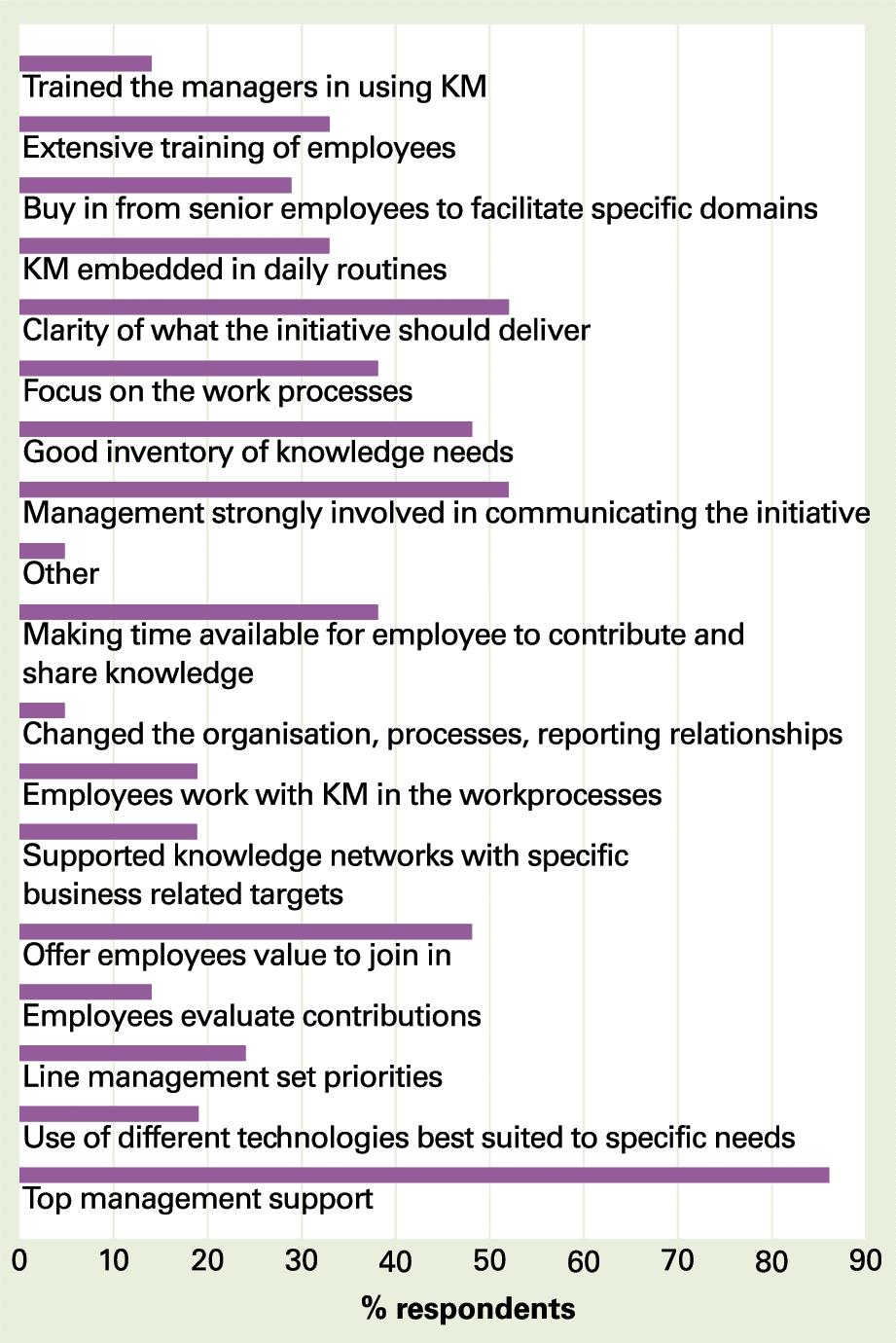
The ‘high score ’ initiatives started in the last two years are communities of practice, competence centres and information centres. These initiatives will receive less attention in the next two years.
The runners up for the top knowledge management initiatives are supplier communities, customer communities and knowledge repositories.
Initiatives shift focus from internal (databases, employees) to external knowledge sharing (suppliers, customers, etc.).
Furthermore, KM will increasingly be imbedded in the daily work processes to assure the use of best practices in daily business as much as possible.
Figure 11: Which initiatives started in the last two years? Which start in the next two years?
Companies do well by adopting a business approach and a focus on work processes, but stay behind on implementation
Companies have been successful in gaining top management support, clarifying deliverables and involving line management in setting priorities and communicating the initiative.
A third made changes to the way the organisation works with knowledge in the daily routines of employees, made time available to contribute and share, or created buy in from senior employees to facilitate specific domains.
The majority of companies stay behind on implementation and score low on success factors like business related targets, specifying how knowledge should be captured and delivered to support the needs in work processes.
Figure 12: What has proven crucial to its (successful) implementation?

Insight 9. Implementation difficulties Companies underestimate the cultural change needed to implement knowledge management through busy employees
Many companies have difficulties in making the necessary changes to the organisation and underestimate the complexity of its implementation through influencing others.
Key difficulties are:
Making knowledge management a daily priority for employees.
Lack of knowledge sharing culture.
Lack of time or priority of users.
Integrating knowledge management in the business processes.
Complexity of implementation.
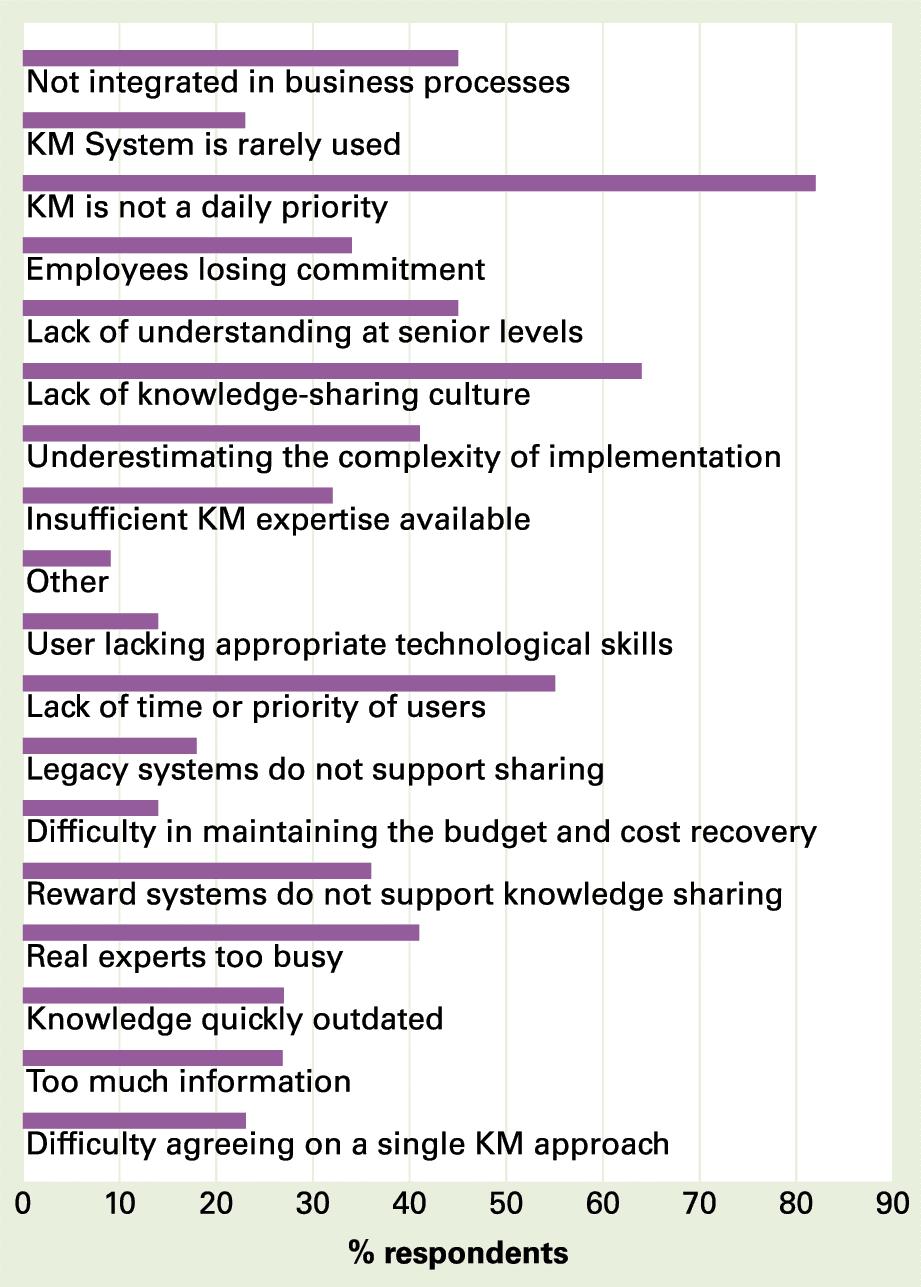
Lack of understanding at senior levels.
Underestimating the complexity of implementation.
Figure 13: What are the difficulties you encountered during the implementation?
Insight 10. Key challenges ahead Implementation is the key challenge ahead for further successful deployment of knowledge management
The implementation of knowledge management as a continuous process embedded in daily work and managed by line management is the key challenge ahead.
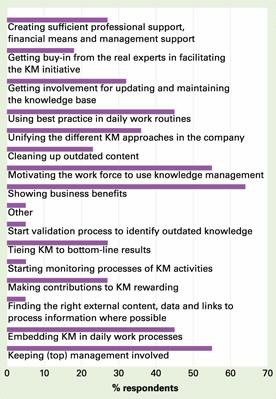
Key challenges are:
Showing business benefits.
Motivating the workforce to use KM.
Keeping top management involved.
Embed knowledge management in daily work processes.
Using best practise in daily work routine
Get involvement for maintaining the knowledge.
Unify the different KM approaches in the company.
Figure 14: What do you see as the major challenges ahead?